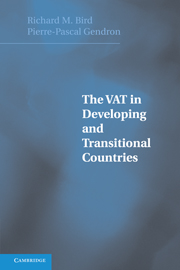Book contents
- Frontmatter
- Contents
- List of Tables
- Preface
- 1 Why This Book?
- 2 The Rise of VAT
- 3 Is VAT Always the Answer?
- 4 Trade and Revenue
- 5 Equity and the Informal Sector
- 6 What Should Be Taxed?
- 7 Key Issues in VAT Design
- 8 New Issues in VAT Design
- 9 Administering VAT
- 10 Dealing with Difficulties
- 11 The Political Economy of VAT
- 12 Where Do We Go from Here?
- Annex
- References
- Index
11 - The Political Economy of VAT
Published online by Cambridge University Press: 16 November 2009
- Frontmatter
- Contents
- List of Tables
- Preface
- 1 Why This Book?
- 2 The Rise of VAT
- 3 Is VAT Always the Answer?
- 4 Trade and Revenue
- 5 Equity and the Informal Sector
- 6 What Should Be Taxed?
- 7 Key Issues in VAT Design
- 8 New Issues in VAT Design
- 9 Administering VAT
- 10 Dealing with Difficulties
- 11 The Political Economy of VAT
- 12 Where Do We Go from Here?
- Annex
- References
- Index
Summary
This chapter differs from the rest of the book in that issues discussed relate more to the political economy of taxation in general than to the specific economic and administrative aspects of VAT as such. We discuss this broader issue for two reasons. One reason is simply that in many developing and transitional countries controversies about VAT have become one of the central ways in which tax issues arise in the political arena. For better or worse, VAT has often become the ‘poster child’ of tax reform, so VAT reform is inevitably closely related to tax reform in general. The second reason, more directly related to this book, is that the performance of VAT in any country inevitably reflects politics – both short-run factors such as the calculations of particular interest groups and long-run factors such as the nature of political institutions. This critical political dimension of the policy process is often simply taken as given by those directly concerned with VAT design and implementation. Ideally, however, those so engaged should be as aware as possible of the manner in which such factors may impact on (and in turn be affected by) such central elements of VAT design and implementation as exemptions. For instance, being forewarned that a particular sector is politically ‘untouchable’ may enable policy designers to work around the problem in a way that does less damage to the tax as a whole than might otherwise be the case.
- Type
- Chapter
- Information
- The VAT in Developing and Transitional Countries , pp. 193 - 212Publisher: Cambridge University PressPrint publication year: 2007



